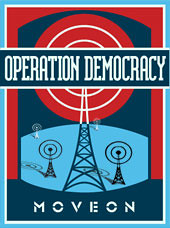Freedom Democrats
I’ve been spending a lot of time lately reading various libertarian blogs. I’ve had a long-time fascination with the libertarian political philosophy, in part because it doesn’t fit the normal left-right political discourse of this country. Libertarians believe that government should be as small as possible. This makes them like conservatives in that that they are typically against higher taxes and government regulations of business, but it makes them like liberals in that they are against censorship, government intrusion into private, personal choices, and against imperialist, interventionist foreign policy (like the war in Iraq).
So, libertarians aren’t liberal or conservative. The more accurate illustration of the range of political views is represented by the World’s Smallest Political Quiz. This handy little tool was written by libertarians but seems pretty accurate based on the folks I've known who have taken it, and its set-up presents a much richer picture of political ideologies than you get from watching CNN or FOX news. The opposite of libertarians are authoritarians, people who are willing to use the power of government to intrude in your life in a wide variety of ways, both economic and social.
What has intrigued me lately is the number of blogs that advocate that libertarians have a political home in the Democratic Party. The most comprehensive of these blogs is Freedom Democrats, and their key political organization is the Democratic Freedom Caucus. Libertarians already have a political party (the LP), but its candidates rarely appear as even a blip on election day, and LP members spend most of their time arguing with each other over the finer points of who has the purest libertarian philosophy. In short, they aren’t about winning elections. Through the 1990’s, many libertarians who were interested in making incremental changes to limit the power of government got interested in the Republican Liberty Caucus, represented by the most consistently libertarian member of Congress, Ron Paul (R-TX), a former LP presidential candidate. But now that Republicans control every branch of the federal government, it’s abundantly clear that they are not a party of freedom, and in fact have launched an all-out assault on the personal liberties of everyday Americans (examples too numerous to mention). Not only do the Republicans seem to have no regard for personal liberty, but evidence suggests that they are not really serious about limiting the size of government in other ways. Historically, the size of government has grown far more dramatically and the economy has grown more slowly under Republican presidents than Democratic presidents. Just this week the Republicans voted overwhelmingly to raise the debt limit of the federal government again. The situation is so bad that a former Bush staffer has labeled the president a “fake” conservative.
Freedom Democrats host Logan Freree has demonstrated the difference between Democract and Republican attitudes toward freedom using the matrix of the World’s Smallest Political Quiz to analyze the voting records of members of Congress. Using a selection of votes from the last Congress to judge both the economic and social values votes of the House and Senate, Freree found that the vast majority of Republicans were overwhelmingly authoritarian—not conservative or libertarian. The Democrats, on the other hand, were far more diverse, but occupy much more space in the libertarian corner of the map. The most libertarian member of the Senate? Democrat Russ Feingold of Wisconsin.
I’m not sure what to make of all this. I am not really a libertarian by most definitions of the word (I came out "liberal" on the quiz; big surprise), though I have always been fascinated by how wonderfully consistent (if a bit naïve) the libertarian position is as a philosophy. But I do think a moderate libertarian position has much to contribute to the political discourse of this country, especially in these authoritarian times. I think most Americans believe the government has a legitimate role to play in regulating environmental protection, worker safety, national defense, and mitigating the damage that can be wrought by unrestrained market forces. However, I think they also believe that the government should carry out these tasks as efficiently as possible, using the least amount of coercion and intrusion as possible. Americans want a lean, limited, efficient government. There should always be a default advocacy against the use of government, and the burden of proof should always be on those who would expand the government’s influence, whether in our wallets, our workplaces, our bedrooms, our bloodstreams, our computers and phone lines, or the affairs of other nations who pose no direct threat to our freedom.
I’m not sure that these moderate Americans, who are socially liberal and fiscally conservative, have much of a political home in either major party. But it is clear that the current Republican leadership of our nation has failed utterly to protect our liberties and has in fact done more damage to personal freedom and has expanded the size of government more than any Congress/President in recent memory. Do the Democrats provide much more protection? Who knows in the long run, but for now they are the only hope to stem the tide of unrestrained government power in all aspects of our lives.



0 Comments:
Post a Comment
<< Home